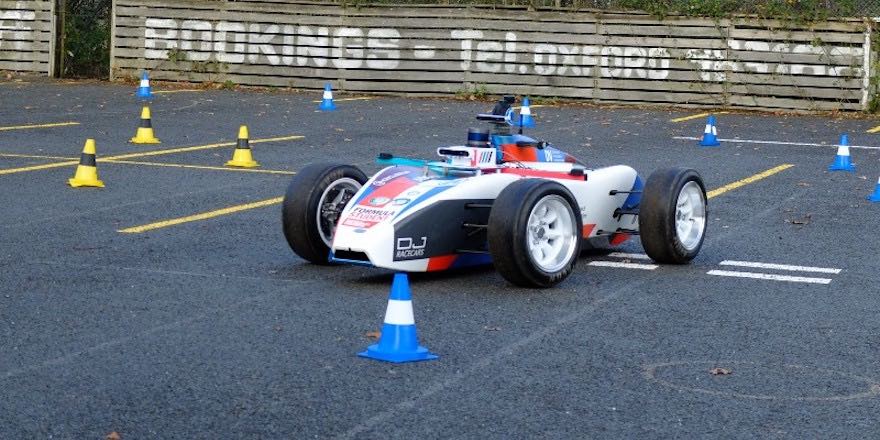Oxford Brookes Hosts Event Looking at the Future of Autonomous Transport
The future of transport and the challenges facing the development of smart, connected, and autonomous vehicles was discussed at a two-day event at Oxford Brookes University in December.

The “Connected, Automated Vehicles and the Future of Transport” event took place at Oxford Brookes University’s Wheatley campus on December 13-14, and gave an insight from leading experts into the vehicles of tomorrow.
The event was organized and led by Dr. Andrew Bradley, Reader in Motorsport/Automotive Engineering Design, and head of Oxford Brookes’ Autonomous Driving and Intelligent Transport group.
Dr. Bradley said: “Transport as we know it is undergoing a revolution. Electric, autonomous, and smart connected vehicles are set to take the world by storm, changing the way we travel around our towns and cities. We organized this event to analyze and discuss the outstanding challenges, and how academics and industry experts can work with the public to shape the future of transport.
Identifying challenges of autonomous vehicles
“While autonomous vehicles (AVs) are currently operating in some real-world, controlled environments, before we can see the full implementation of AVs driving anywhere at any time, a challenge for us is to understand how we can program them to be able to predict the behaviour of other road users. Right now, AVs have a 360-degree range of sight, which is far superior to humans. However, there is considerable work to be done to ensure they are able to make sound judgements on the behaviour of other road users.
“Also, a lot of work needs to be done with regards to simulation, for testing Avs, and teleoperation — how they can be controlled remotely. In future, this will enable them to be operated remotely by humans, which would enable safe intervention in challenging situations where the vehicle might need a little helping hand.
“This event brought academic and industry experts together under one roof, where we could discuss how we can work with each other to find solutions to these challenges, so that we can move closer to seeing these innovative vehicles take to our streets.”
First day of the event
The first day of the event explored the rising adoption of self-driving and electric vehicles, and the opportunities for the evolution of cities. This included breakout discussions featuring attendees from industry and academia. Some of the experts at the event included Mark Preston, Founder and Chief Strategy Officer of StreetDrone, an Oxford-based company that develops autonomous technology solutions; Ruth Anderson, iHub Future of Mobility Technical Lead at Oxfordshire County Council; Oliver Huke, Test Facility Manager for Autonomous Vehicles and Remote Robotics at RACE UK Atomic Energy Authority (UKAEA), and also Dr. Fabio Iapaolo, of the Institute for Ethical AI at Oxford Brookes University.
An evening with the Institution of Mechanical Engineers featured a presentation from the University’s own Oxford Brookes Racing Autonomous team, explaining to attendees how an AV is programmed to understand surroundings, from perception to decision making and control.
Second day of the event
The second day of the event was led by representatives of the government’s Centre for Connected and Autonomous Vehicles, and Innovate UK, where attendees heard about the Automated Vehicles Bill, which is legislating for the deployment of autonomous vehicles on UK roads.
Attendees also heard about the latest research and technology in robotics and engineering, specifically state-of-the-art robots and drones, and electric and autonomous vehicles.
Following the success of the two-day event, Dr. Bradley says that the future of the Autonomous Driving and Intelligent Transport group is looking bright.
Looking to what’s ahead
He says: “An ambition of ours in the group is to develop new and existing partnerships with industry, in order to develop cutting-edge autonomous vehicle technologies to the point whereby they can operate in a variety of different and challenging environments and weather conditions, as well as being able to predict the behaviour of other road users and interact safely with them.
“Funding from the EU research and innovation program, Horizon 2020, is assisting us with this type of work, which also includes enhancing the vehicles’ understanding of challenging road scenarios. We will be making extensive use of facilities at the UKAEA site in Culham, Oxfordshire, in order to test the autonomous vehicles in both real and virtual reality worlds. This will enable us to see how vehicles react to potentially difficult or dangerous road situations, without putting anyone at risk in the real world. Only when it was safe to do so, would we then start to trial them into the real world.
“As well as our research, the Oxford Brookes Racing (OBR) Autonomous team are also hard at work, hoping to win the international Formula Student-Artificial Intelligence competition, which takes place at Silverstone in July 2024. The team are designing and building their own fully autonomous vehicle to compete at the annual competition.”
Learn more about Oxford Brookes University